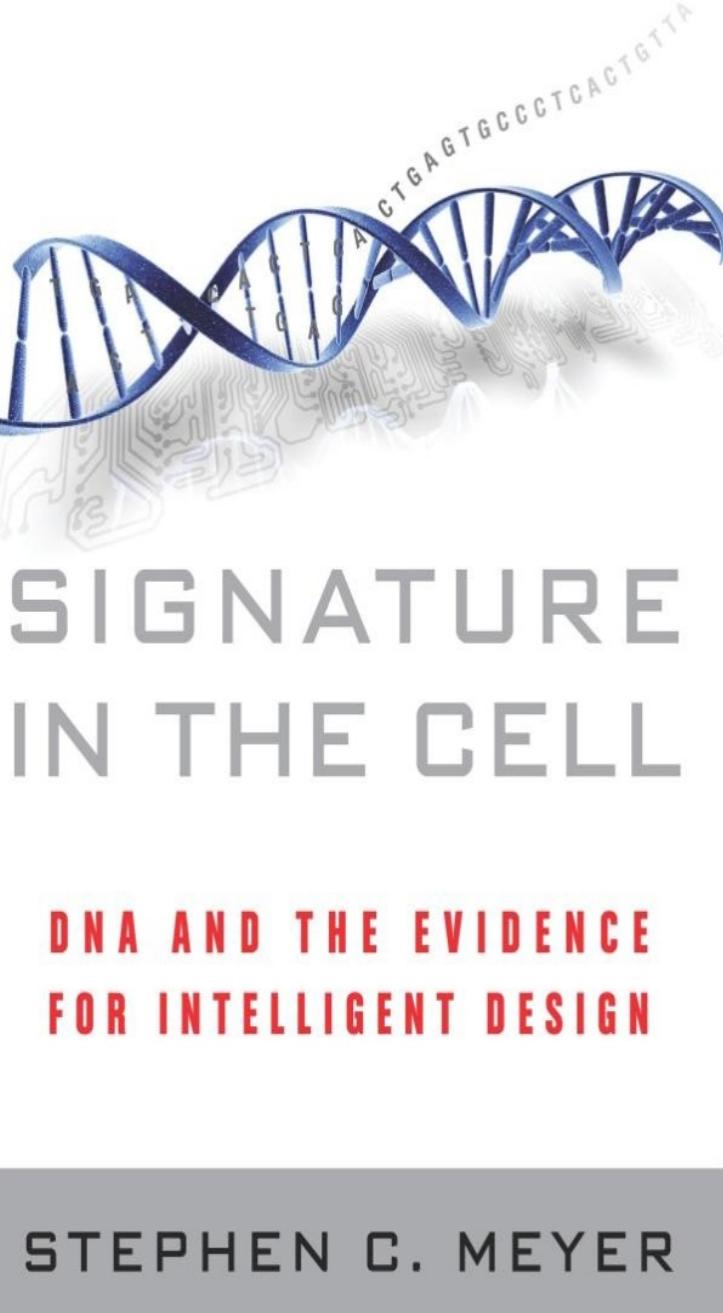Signature in the Cell: DNA and the Evidence for Intelligent Design by Stephen C. Meyer

Author:Stephen C. Meyer
Language: eng
Format: mobi, epub, pdf
Tags: Non-Fiction, Science, Philosophy, Religion
Publisher: HarperOne
Published: 2009-06-23T00:00:00+00:00
Conclusion
Since the intelligent-design hypothesis meets both the causal-adequacy and causal-existence criteria of a best explanation, and since no other competing explanation meets these conditions as well—or at all—it follows that the design hypothesis provides the best, most causally adequate explanation of the origin of the information necessary to produce the first life on earth. Indeed, our uniform experience affirms that specified information—whether inscribed in hieroglyphics, written in a book, encoded in a radio signal, or produced in a simulation experiment—always arises from an intelligent source, from a mind and not a strictly material process. So the discovery of the specified digital information in the DNA molecule provides strong grounds for inferring that intelligence played a role in the origin of DNA. Indeed, whenever we find specified information and we know the causal story of how that information arose, we always find that it arose from an intelligent source. It follows that the best, most causally adequate explanation for the origin of the specified, digitally encoded information in DNA is that it too had an intelligent source. Intelligent design best explains the DNA enigma.
By the late 1990s, I had become convinced—at least provisionally—that intelligent design was the only known cause of specified information. As a result, I began to sketch out the case for intelligent design as the best explanation for the DNA enigma. In the years that followed (1998–2003), I published a series of articles arguing that intelligent design provides a better explanation than any competing chemical evolutionary model for the origin of biological information.36 Since then I have continued to examine additional hypotheses and simulations such as the RNA world and genetic algorithms. The case for intelligent design has grown only stronger. Not only have these new approaches failed to provide an adequate explanation for the origin of biological information; they have strengthened the positive case for design that I had previously formulated.
Though advocates of intelligent design have been labeled by some of their opponents as creationists (even “creationists in cheap tuxedos”!), the case for intelligent design depends, ironically, upon a form of scientific reasoning—namely, uniformitarian reasoning—that creationists have often bitterly opposed. Indeed, the case for intelligent design depends on the uniformitarian method of scientific reasoning that Darwin himself used in formulating his argument in On the Origin of Species. In light of this and the evidence considered in the preceding chapters, I eventually answered the question that had first seized my attention back in 1985. I concluded that a rigorous scientific argument for intelligent design could be formulated. This chapter has described exactly how I came to that conclusion and why I think it best.
Download
Signature in the Cell: DNA and the Evidence for Intelligent Design by Stephen C. Meyer.epub
Signature in the Cell: DNA and the Evidence for Intelligent Design by Stephen C. Meyer.pdf
This site does not store any files on its server. We only index and link to content provided by other sites. Please contact the content providers to delete copyright contents if any and email us, we'll remove relevant links or contents immediately.
Sapiens: A Brief History of Humankind by Yuval Noah Harari(13036)
Sapiens by Yuval Noah Harari(4528)
Homo Deus: A Brief History of Tomorrow by Yuval Noah Harari(4272)
Pale Blue Dot by Carl Sagan(3995)
Origin Story: A Big History of Everything by David Christian(3133)
Livewired by David Eagleman(3113)
Brief Answers to the Big Questions by Stephen Hawking(2872)
Inferior by Angela Saini(2829)
Origin Story by David Christian(2677)
The Evolution of Beauty by Richard O. Prum(2550)
Signature in the Cell: DNA and the Evidence for Intelligent Design by Stephen C. Meyer(2495)
The Gene: An Intimate History by Siddhartha Mukherjee(2488)
Aliens by Jim Al-Khalili(2376)
How The Mind Works by Steven Pinker(2206)
Sex at Dawn: The Prehistoric Origins of Modern Sexuality by Ryan Christopher(2148)
From Bacteria to Bach and Back by Daniel C. Dennett(2145)
A Short History of Nearly Everything by Bryson Bill(2131)
Endless Forms Most Beautiful by Sean B. Carroll(2079)
Who We Are and How We Got Here by David Reich(2057)
